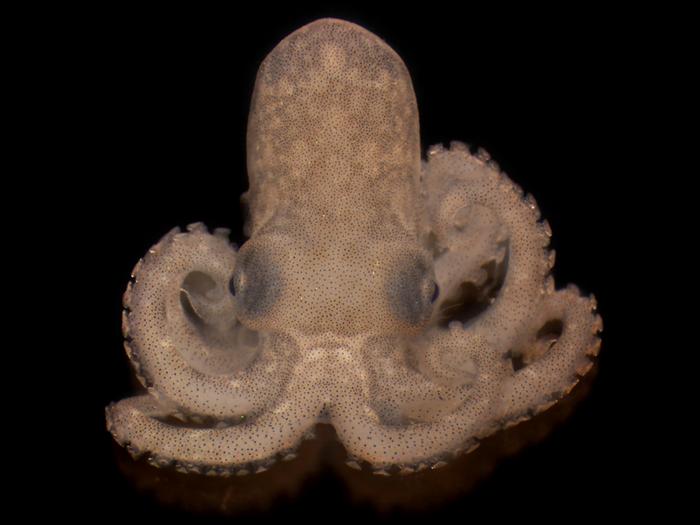While climate change has led to an increase in the abundance of octopuses, heat stress from projected ocean warming could impair their vision and impact the survivability of the species.

Credit: Qiaz Hua
While climate change has led to an increase in the abundance of octopuses, heat stress from projected ocean warming could impair their vision and impact the survivability of the species.
“We found several proteins important for vision that were affected by thermal stress,” says Dr Qiaz Hua, a recent PhD graduate from the University of Adelaide’s School of Biological Sciences.
“One of them is a structural protein found in high abundance in animal eye lenses to preserve lens transparency and optical clarity, and another is responsible for the regeneration of visual pigments in the photoreceptors of the eyes.
“The levels of both of these proteins were significantly reduced under projected ocean warming conditions, which suggests that octopus vision is likely to be impaired under thermal stress.”
Octopuses are highly visual animals, with 70 per cent of the octopus brain dedicated to vision – which is 20 per cent more than in humans.
“The primary functions of vision include but are not limited to visual acuity, discrimination of brightness, depth perception, motion detection and polarisation, and it is crucial for detecting predator and prey as well as for communication,” says Dr Hua.
“Having impaired vision will affect an octopus’s chances of survival in the wild through increased predator risk as well as lower foraging success.”
To make this finding, the research team, including academics from the University of South Australia, University of California Davis, and the South Australian Research and Development Institute’s aquatic sciences division, exposed Octopus berrima embryos to different temperature treatments, a control 19°C exposure, 22°C to model current summer temperatures, and 25°C to model projected summer temperatures.
“The future-projected temperature was based on the Intergovernmental Panel on Climate Change’s projected increase of about 3°C of warming by 2100,” Dr Hua says.
In addition to impaired vision, Dr Hua found increased ocean water temperatures would have a negative effect on octopus broods.
“We found a high mortality rate under future warming conditions. Out of three replicate octopus broods, none of the eggs hatched for two of them and less than half of the eggs hatched for the remaining brood,” Dr Hua says.
“In the broods where none of the eggs hatched, the mothers died naturally while the eggs were still in early development stages.
“Because maternal care of embryos occurs in octopuses, global warming could have a simultaneous impact on multiple generations, with the low survival rate of the embryos caused by the direct effect of thermal stress as well as the indirect effect of thermal stress on the mothers.
“Our study shows that even for a highly adaptable taxon like octopuses, they may not be able to survive future ocean changes.”
Other effects of higher temperatures which have been observed in octopuses include a higher metabolic rate, reduced size at maturity, and even a range shift in the distribution of some species.
“We hope that future research would examine a combination of environmental stressors including ocean acidification, warming, and deoxygenation,” Dr Hua says.
“It would also be useful to do a transgenerational experiment to see if sensitivity or tolerance to the environmental stressors is passed down from one generation to the next, which help us understand the impacts on the continuation of the species.”
Journal
Global Change Biology
Method of Research
Experimental study
Subject of Research
Animals
COI Statement
The authors declare no competing interests.



